Overview
Ecommerce personalization is a game changer for manufacturers! It boosts success by enhancing customer engagement, ramping up sales, and building loyalty through tailored shopping experiences. Have you ever noticed how personalized recommendations pop up just when you need them? That’s no accident! This article dives into how these targeted communications can lead to higher conversion rates and lower cart abandonment. In the competitive manufacturing landscape, these strategies can really improve business performance. So, why not embrace personalization and see the difference it can make?
Introduction
Ecommerce personalization is shaking things up for manufacturers, creating a fantastic chance to boost customer engagement and ramp up sales. With Generation Alpha stepping onto the scene as a major consumer force—projected to wield a whopping $5.5 trillion in purchasing power by 2029—the need to customize shopping experiences is more crucial than ever. But how can manufacturers tap into personalization to not just meet but surpass the ever-changing expectations of consumers while also handling the tricky waters of data privacy?
In this article, we’ll explore seven impactful ways ecommerce personalization can drive manufacturers toward success, unveiling strategies that can lead to greater loyalty, increased sales, and a solid competitive edge in the market.
GenAlpha Technologies: Streamlining Ecommerce Personalization for Manufacturers
At GenAlpha Technologies, we focus on crafting digital solutions that simplify ecommerce personalisation for producers. Take our flagship product, Equip360, for instance. It’s designed to streamline inventory management and boost client interactions. By tapping into advanced analytics and first-party customer data, we empower producers to create shopping experiences that feel tailor-made for each customer. This approach not only drives engagement but also fuels sales growth.
Now, let’s talk numbers. Generation Alpha is projected to wield a whopping $5.5 trillion in purchasing power by 2029. That’s a game changer! It highlights just how crucial ecommerce personalisation is becoming. As Marsten points out, ecommerce personalisation helps to make retail offers less awkward, which is a big deal for producers trying to keep up with evolving consumer expectations.
Additionally, as Generation Alpha increasingly influences family buying decisions, producers who embrace these innovative strategies are likely to see a boost in loyalty and satisfaction among their clients. This can lead to improved business performance. So, why not take the ? It’s not just a trend; it’s a smart move for the future!
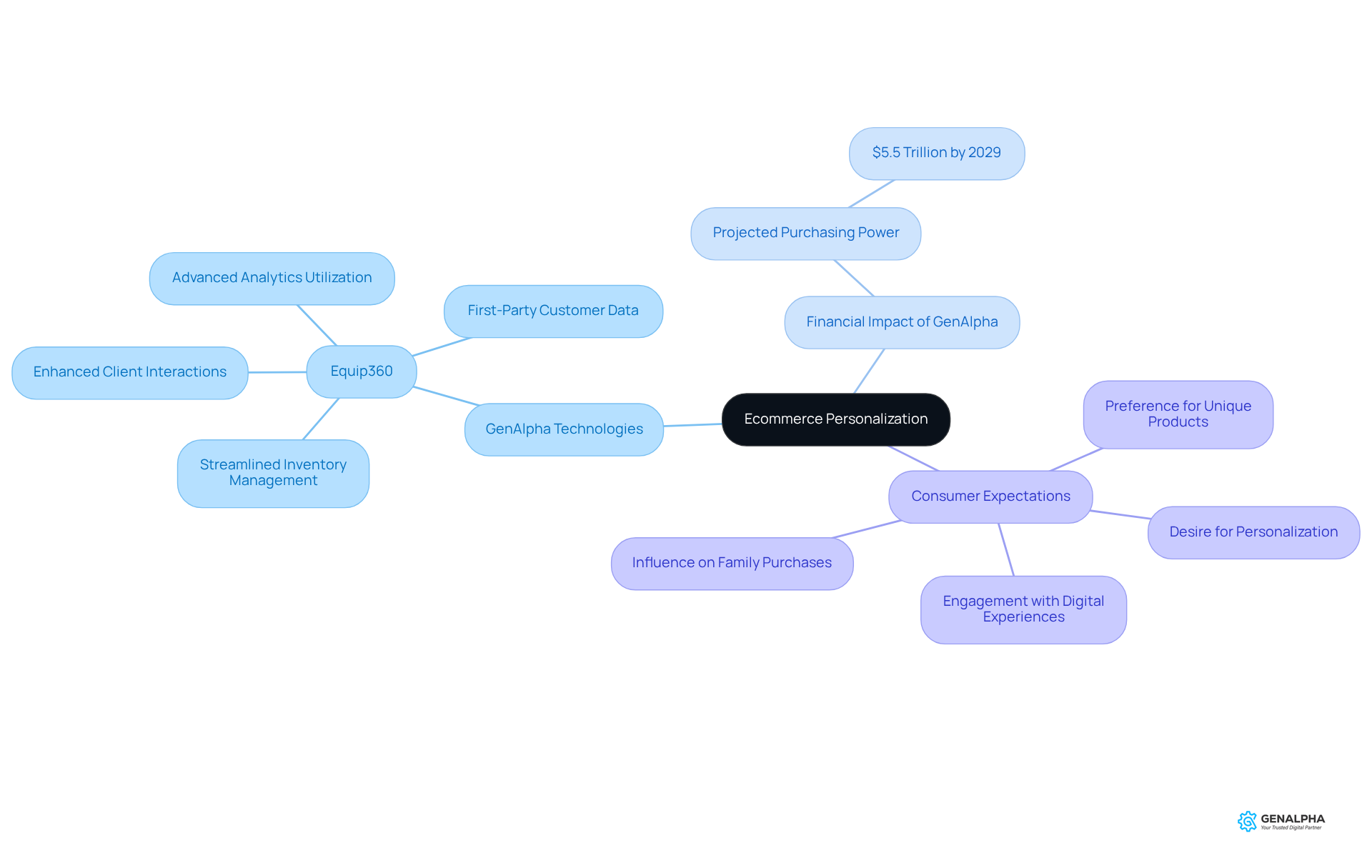
Enhanced Customer Experience: Personalization Drives Engagement
Ecommerce personalisation is essential for creating an engaging client experience in the manufacturing sector, don't you think? By utilizing ecommerce personalisation to tailor product suggestions, content, and communications to individual preferences, manufacturers can really boost client satisfaction. For instance, when businesses tap into data from past purchases, they can suggest products that truly resonate, leading to a more intuitive and enjoyable shopping experience.
This , driven by ecommerce personalisation, not only fosters loyalty but also encourages customers to explore more of what the brand has to offer. In fact, did you know that companies that embrace customization strategies generate 40% more revenue than those that don’t? That really underscores how vital ecommerce personalisation is for achieving success in e-commerce.
Moreover, a whopping 83% of consumers are likely to make a purchase from a brand that highlights specific products they recently searched for. This clearly shows the power of ecommerce personalisation in enhancing client engagement. However, it’s equally important for producers to strike a balance between personalization and data privacy. Ensuring transparency and compliance with regulations like GDPR and CCPA is essential for building trust with clients. So, how can your brand start personalizing experiences while keeping privacy in check?
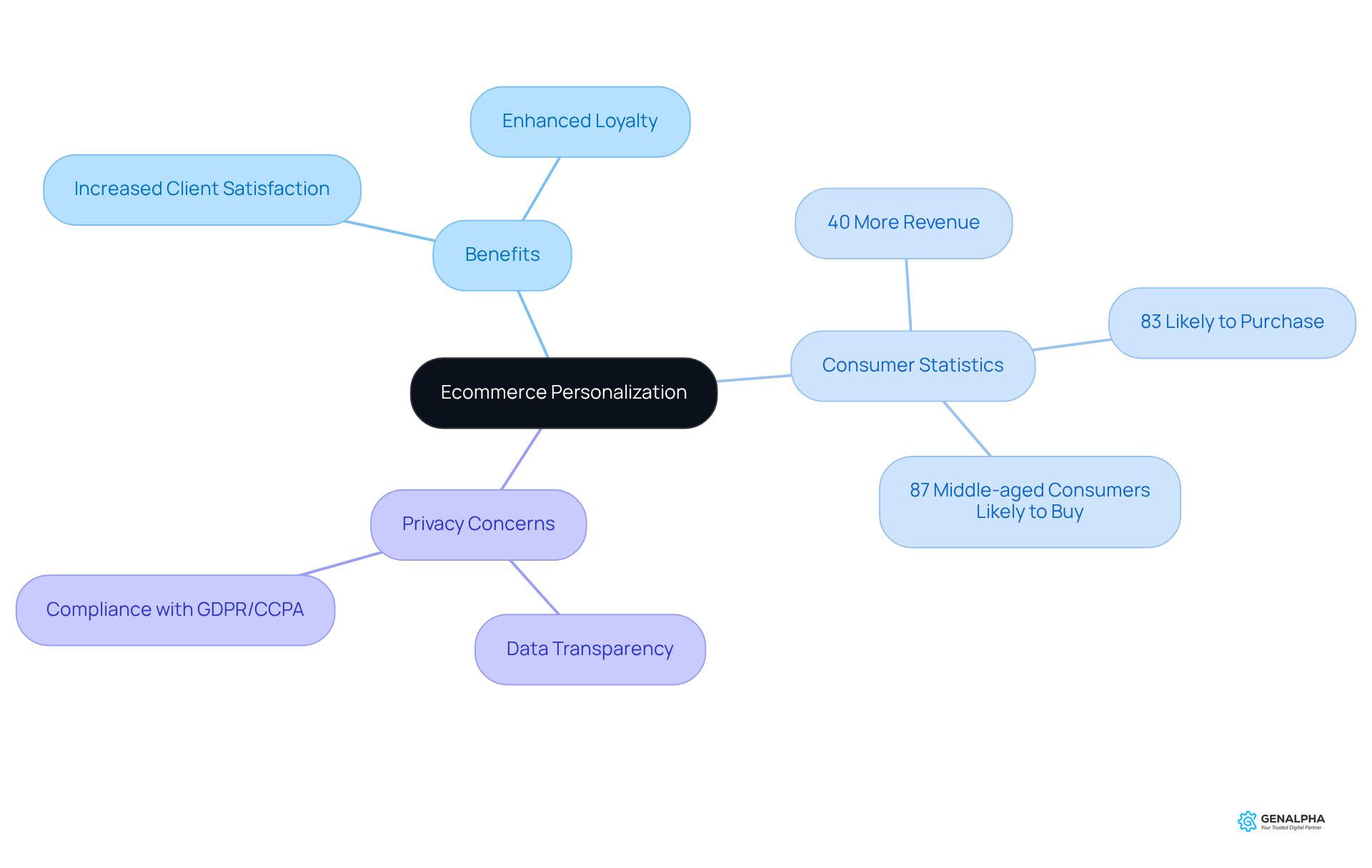
Increased Sales and Higher Average Order Values: The Financial Upside of Personalization
Ecommerce personalisation significantly boosts sales and raises average order values in the manufacturing sector. Think about it: when clients receive ecommerce personalisation through personalized suggestions based on their browsing and buying history, they’re much more likely to make additional purchases. For instance, manufacturers can recommend complementary products right at checkout, which encourages shoppers to toss more items into their carts. This approach not only drives sales but also improves ecommerce personalisation, making the shopping experience more enjoyable and convenient for customers.
Did you know that tailored recommendations can lead to a revenue increase of 10 to 15 percent? Some companies even see gains between 5 to 25 percent! Plus, around 60 percent of consumers are likely to return for more after an ecommerce personalisation shopping experience, highlighting the long-term financial perks of these strategies.
Let’s look at some case studies. Boden, a British clothing retailer, used AI-driven personalization techniques that significantly boosted their operational efficiency and client engagement. While this example comes from retail, it shows how producers can adopt similar strategies to enhance client interactions. In the automotive industry, 86 percent of consumers are more inclined to engage with businesses offering personalized experiences, yet only 55 percent think current platforms effectively deliver these tailored interactions. This gap presents a golden opportunity for manufacturers to , ultimately leading to higher sales and stronger consumer loyalty.
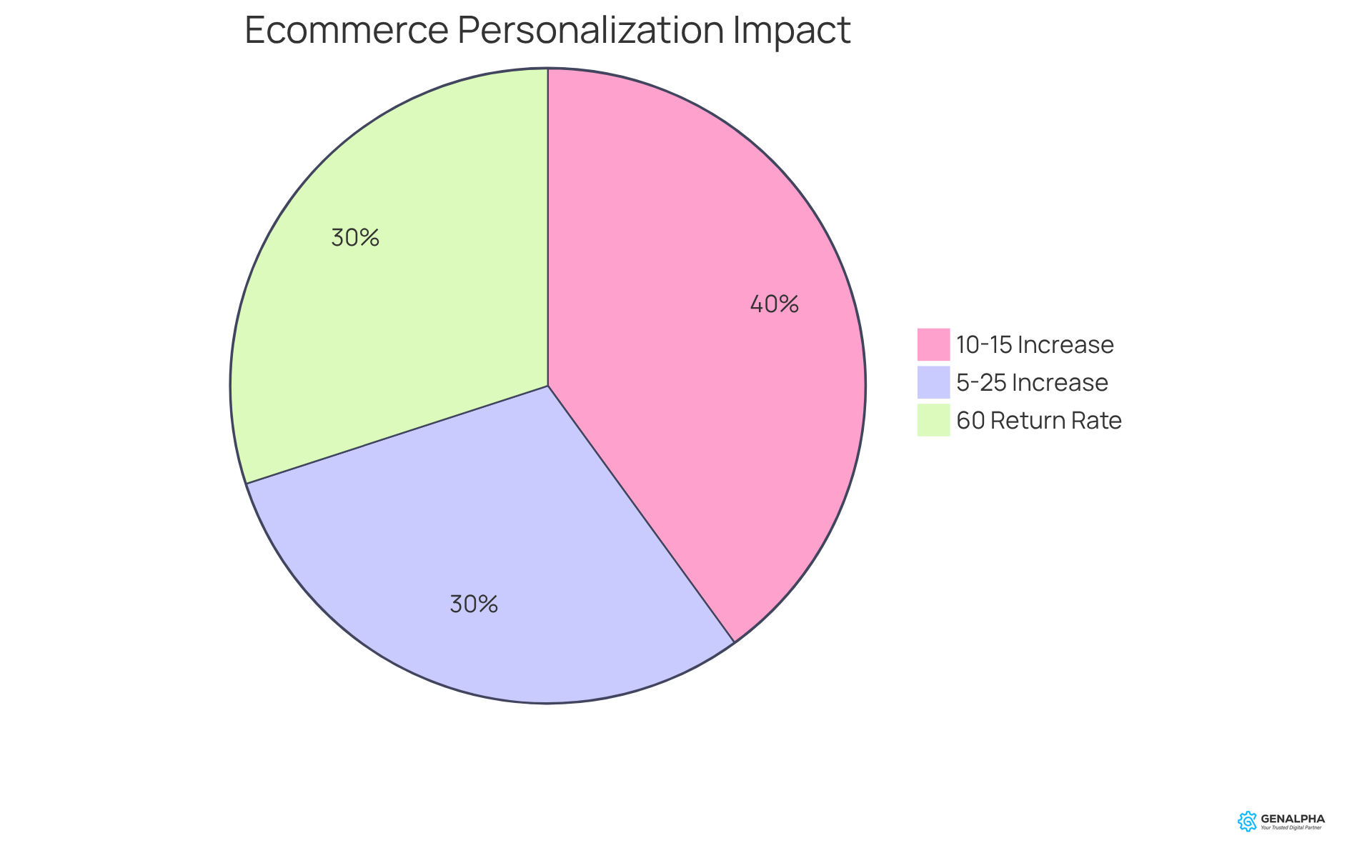
Boosted Customer Loyalty: Retaining Clients Through Personalization
Ecommerce personalisation is a game-changer for boosting client loyalty, especially in the manufacturing world. Think about it: when clients enjoy ecommerce personalisation, they’re way more likely to stick with a brand. For example, ecommerce personalisation, such as sending tailored follow-up emails after a purchase, can make a huge difference in encouraging repeat buys. It’s all about making clients feel valued and appreciated.
And let’s not forget about exclusive discounts! When brands utilize ecommerce personalisation by offering , it not only nudges customers to make more purchases but also helps create a sense of community around the brand. This connection is key—customers want to feel recognized and engaged.
Research shows that a whopping 80% of consumers are more likely to buy when brands utilize ecommerce personalisation to offer tailored experiences. That really highlights how effective these strategies can be for keeping clients around. But here’s a twist: 53% of people felt that personalized experiences sometimes did more harm than good during their last buying journey. This tells us that a two-way approach to customization is crucial for building trust and engagement.
So, how can producers step up? By implementing tailored follow-up communications, they can boost client retention and create lasting connections that drive ongoing success. What are you waiting for? Let’s embrace personalization and see the difference it makes!
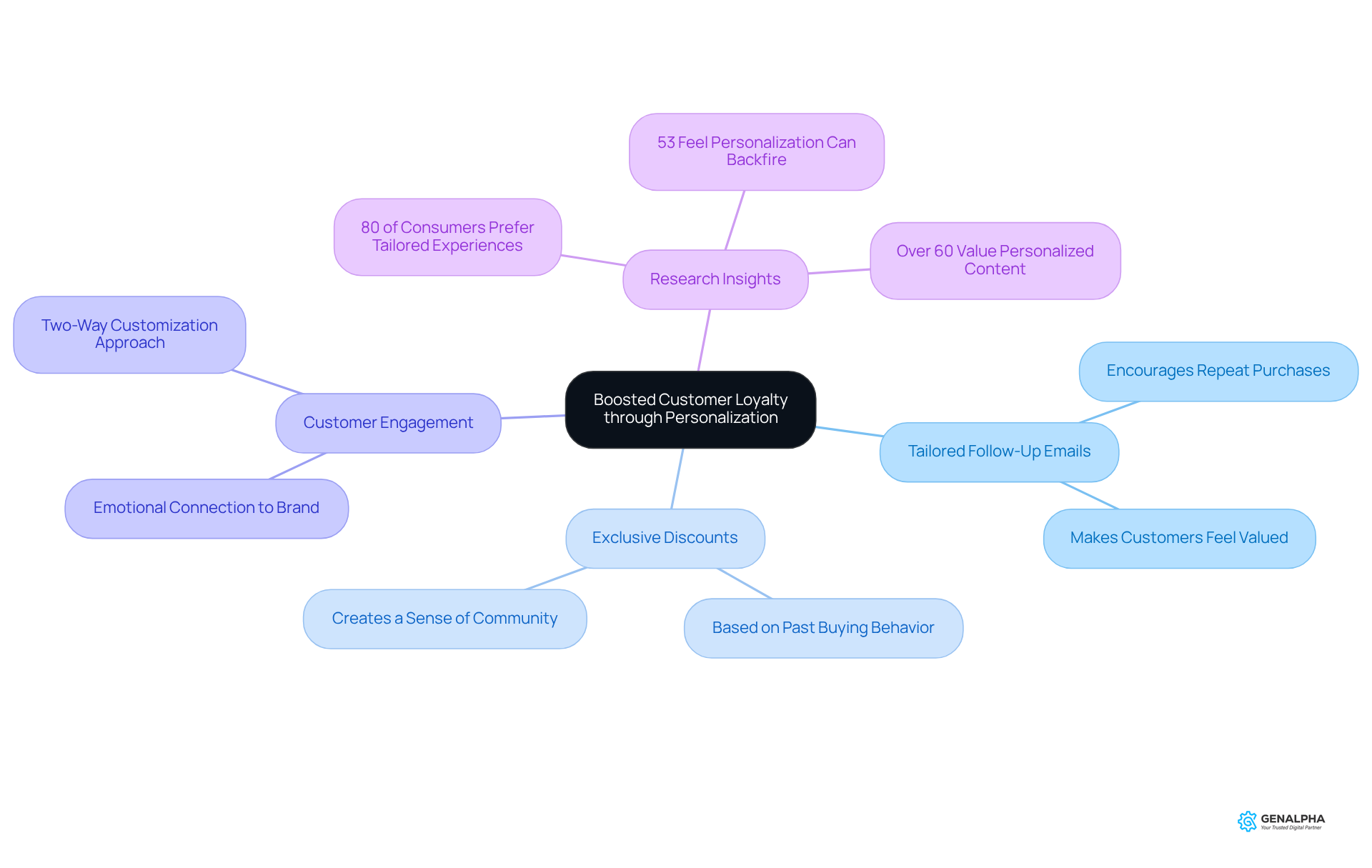
Data-Driven Insights: Leveraging Analytics for Effective Personalization
Data analytics is super important for creating effective personalization strategies for producers. By taking a close look at consumer behavior, preferences, and purchasing patterns, businesses can pull out valuable insights that really shape their marketing efforts. For example, when they spot products that people often view together, manufacturers can whip up enticing bundled offers that make shopping even better. This data-driven approach ensures that personalization initiatives are not just relevant but also significantly boosts client satisfaction and sales performance.
Did you know that 80% of clients are more likely to engage with businesses that offer personalized experiences? This really highlights how crucial it is to . Plus, there are some great success stories out there! Take GenAlpha Technologies' AI-driven recommendation engine, for instance. They’ve harnessed predictive analytics—using collaborative filtering and content-based filtering techniques—to craft personalized product suggestions. This has led to higher average order values and more repeat purchases.
By tapping into the power of data and using tools like Data Cloud and Marketing Cloud Personalization, producers can effectively navigate the complexities of client preferences with ecommerce personalisation. This not only promotes growth but also helps nurture loyalty in a competitive marketplace. So, why not explore how you can leverage these insights to enhance your own strategies?
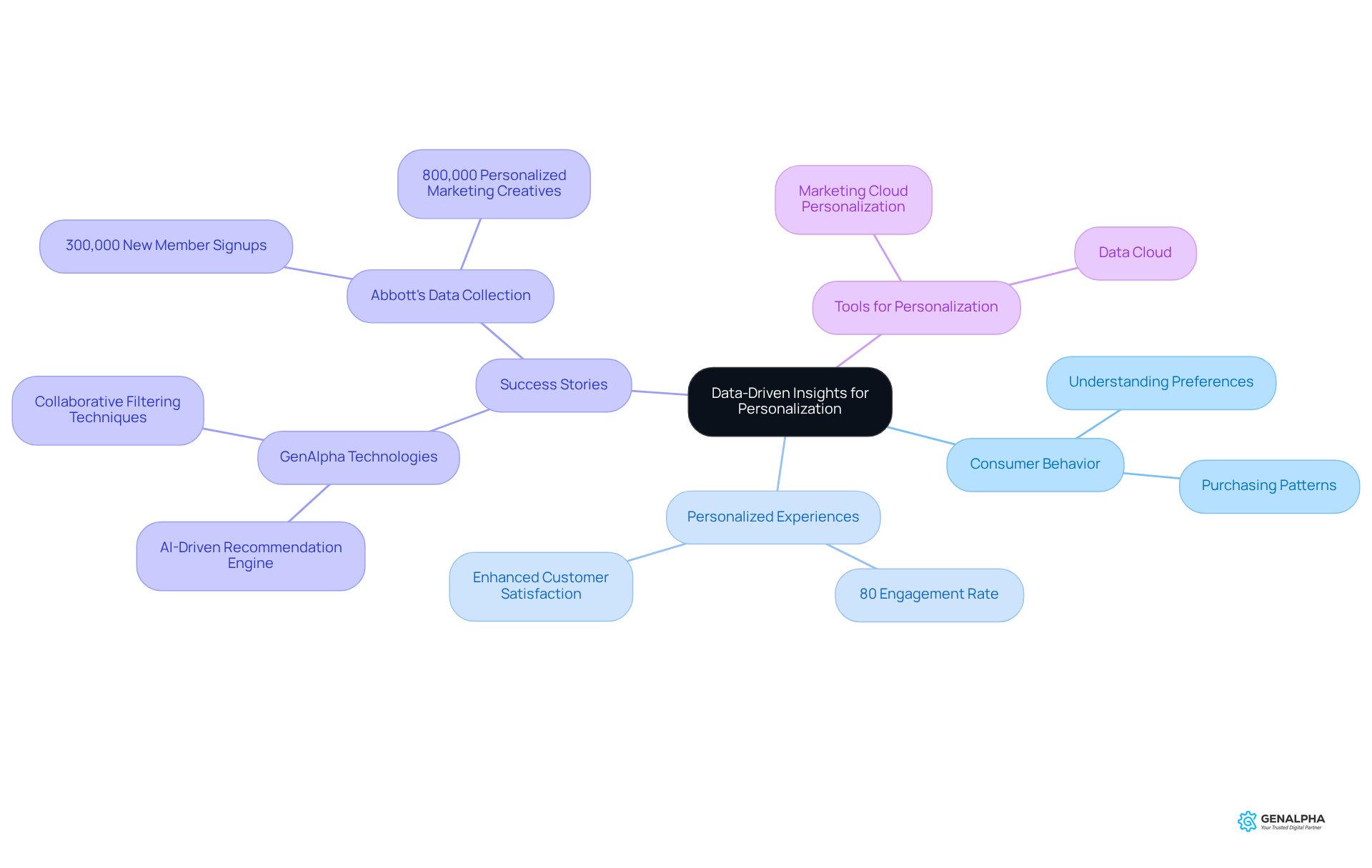
Competitive Advantage: Standing Out with Personalized Experiences
In today’s competitive landscape, personalization is a game-changer for manufacturers. Have you noticed how brands that offer personalized experiences really stand out? They not only set themselves apart from the competition but also build stronger connections with their customers. By understanding what clients truly need and prefer, businesses can customize their marketing strategies and product offerings, creating a compelling value proposition.
This approach doesn’t just attract new clients; it also enhances loyalty among existing ones, positioning the brand as a leader in customer-centric strategies. Research indicates that 80% of consumers are more likely to engage with brands that offer tailored experiences. Even more compelling, 78% are inclined to make repeat purchases from those brands.
But wait, there’s more! Customized marketing can significantly boost client acquisition. For instance, tailored product suggestions can increase conversion rates by as much as 20%. And when it comes to email campaigns, personalized messages generate transaction rates that are six times higher than their non-personalized counterparts.
Manufacturers that focus on understanding their customers’ unique preferences can truly stand out through ecommerce personalisation in the eCommerce space. This focus not only drives growth but also helps establish a strong market presence. It’s worth noting that 74% of online consumers feel frustrated when content isn’t tailored to their needs. So, how can manufacturers implement effective personalization strategies?
Take Booking.com, for example. They use a Digital Experience Platform (DXP) to offer tailored accommodation suggestions based on past behavior. This is a great illustration of how manufacturers can to enhance customer experiences.
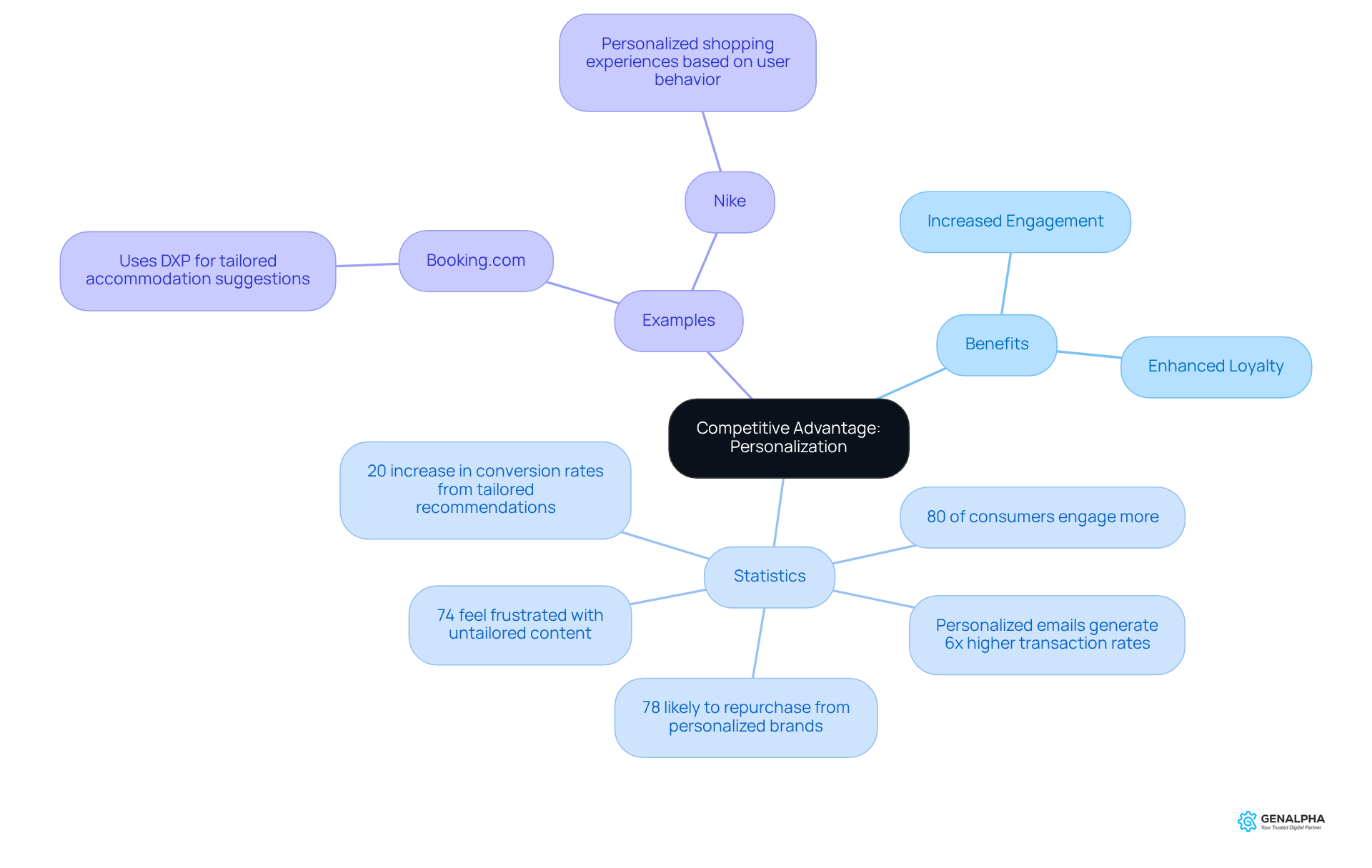
Higher Conversion Rates: Turning Visitors into Customers with Personalization
Ecommerce personalisation is essential for boosting conversion rates in e-commerce. Have you ever noticed how a customized shopping experience makes you feel more inclined to make a purchase? When potential clients enjoy during their tailored journey, their chances of completing a purchase skyrocket. For example, ecommerce personalisation through personalized landing pages that resonate with a visitor's interests not only increases engagement but also helps keep bounce rates low. As Jeff Bezos wisely said, 'If you create an exceptional experience, clients share that information with one another.' And we all know how powerful word of mouth can be!
By utilizing ecommerce personalisation to offer relevant content and product suggestions, brands can guide consumers through their buying journey, making it more likely they'll convert. This strategy not only creates a more engaging shopping experience but also drives sales growth. So, if you're a manufacturer looking to succeed in the digital marketplace, ecommerce personalisation should be at the forefront of your strategy.
Additionally, research shows that a well-designed, user-friendly website is crucial for client satisfaction and purchasing decisions. This highlights the importance of ecommerce personalisation by having tailored landing pages that cater to your audience's needs. So, are you ready to personalize your approach and watch your conversions soar?
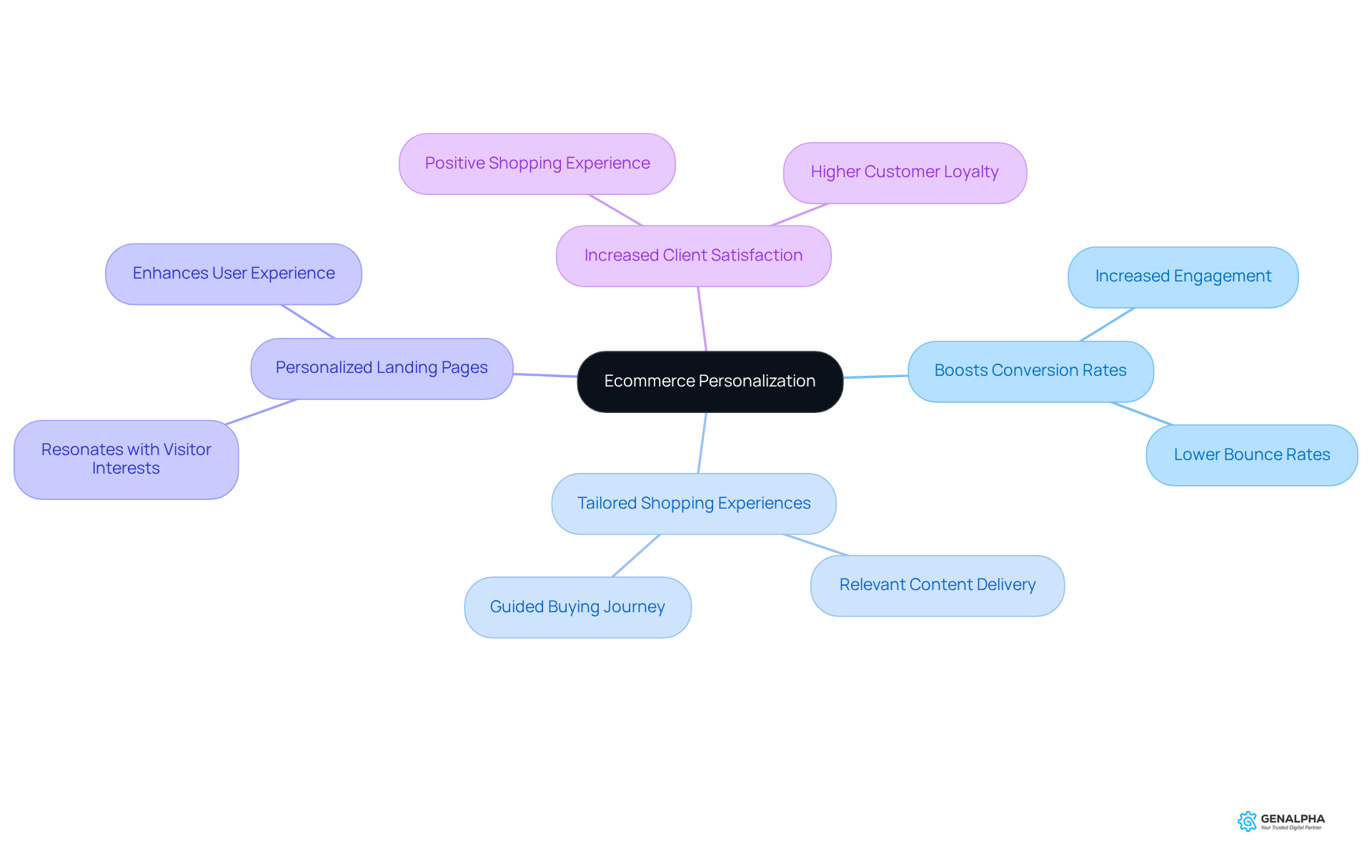
Reduced Cart Abandonment: Keeping Customers Engaged Until Purchase
Cart abandonment is a real headache for eCommerce, with nearly 70% of online shoppers leaving items in their carts without completing their purchases. But here’s the good news: ecommerce personalisation through personalized reminders can really help tackle this issue! Imagine sending customized follow-up emails that highlight the benefits of those products left behind. This approach can reignite buyer interest and encourage them to finish their transactions. For example, a targeted email that showcases the unique features or sustainability aspects of the abandoned items can resonate deeply with customers, prompting them to come back and complete their purchase.
Additionally, offering incentives like discounts or free shipping in these reminders can boost recovery rates even more. Research shows that abandoned cart emails can , illustrating the financial impact of ecommerce personalisation in communication strategies. Think of abandoned carts as missed sales opportunities—capturing even a small percentage can make a big difference in revenue. Some brands have successfully used automated workflows to send reminders shortly after abandonment, achieving conversion rates as high as 19% from these campaigns, compared to the average abandoned cart conversion rate of just 2.9% across industries.
By leveraging advanced analytics and AI-driven segmentation, manufacturers can automatically select the most relevant product recommendations based on browsing history and similar buyer behavior. This ensures that reminders are not only timely but also relevant, significantly boosting the chances of recovering lost sales through ecommerce personalisation. Plus, using an omnichannel strategy allows reminders to be sent through various channels like email and SMS, further enhancing engagement. So, why not take advantage of these strategies to turn those abandoned carts into completed sales?
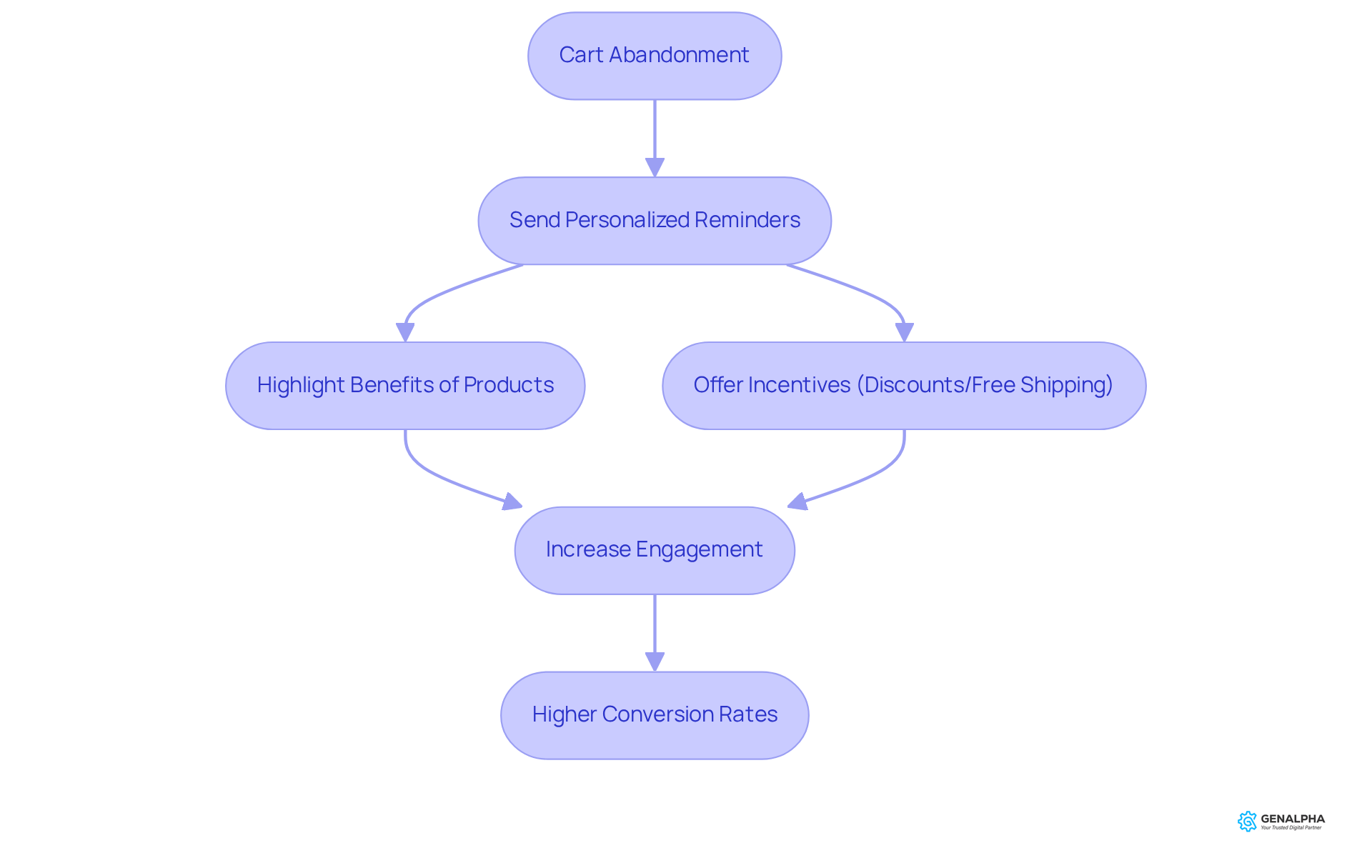
Scalability: Adapting Personalization Strategies for Growth
Scalability is super important for effective customization strategies in the manufacturing world. As producers grow, they expand their client base and product range, which means their customization efforts need to be flexible. Implementing technology solutions that can adapt and grow with the business is key to keeping customization initiatives relevant and impactful.
For example, machine learning algorithms can really help automate and refine these efforts. This allows businesses to scale their strategies efficiently without sacrificing quality. Not only does this approach boost customer interaction, but it also drives growth by ensuring that ecommerce personalisation creates tailored experiences that resonate with a diverse audience.
Did you know that companies using AI-driven customization can see a 20-30% increase in sales conversions? That really highlights the success of these strategies! Take Now Optics, for instance—they achieved a 5-10% lift in open rates through AI-powered segmentation and dynamic content generation.
Moreover, with 71% of consumers expecting ecommerce personalisation in their interactions, it’s clear that producers need to embrace these strategies. The offers a structured approach, detailing different levels of customization that can be adjusted as producers expand their efforts.
So, are you ready to take your customization game to the next level?
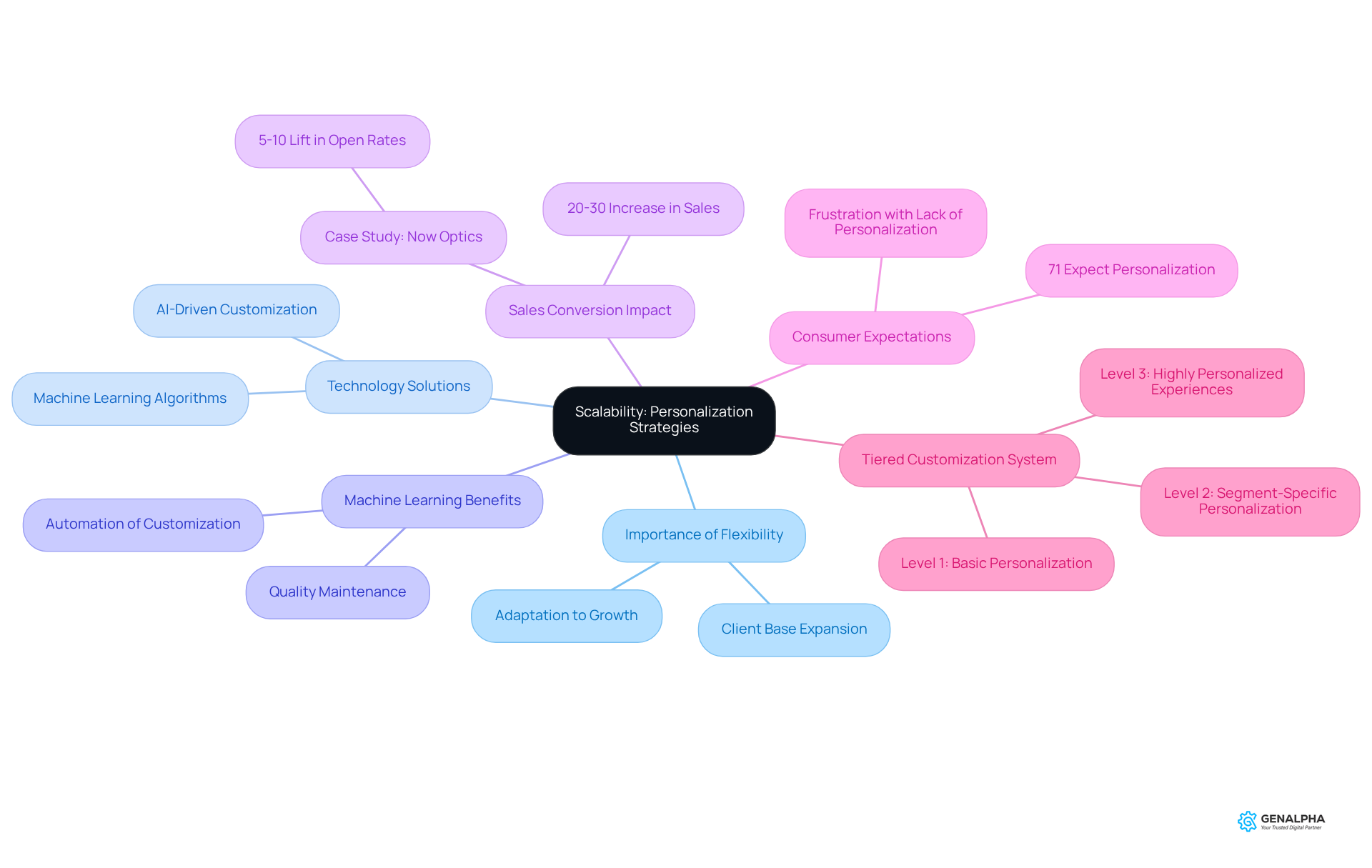
Omnichannel Personalization: Creating a Cohesive Customer Journey
In today's multi-platform world, ecommerce personalisation is essential for creating a seamless experience. Think about it—customers interact with brands through websites, social media, and email. It's crucial for manufacturers to deliver a consistent and personalized experience across all these touchpoints.
By tapping into data from these interactions, businesses can form a complete picture of their clients. This allows for personalized messaging and offers that truly resonate, no matter which platform is being used. A smooth omnichannel experience not only boosts satisfaction but also fosters loyalty and encourages repeat business.
Did you know that:
- 71% of consumers expect tailored interactions?
- 76% feel frustrated when those expectations aren't met?
It’s clear that ecommerce personalisation is important! Brands that nail their personalized strategies can cut client acquisition costs by up to 50% and increase revenues by 5-15%. For instance, companies like Slazenger have seen higher conversion rates and customer satisfaction thanks to AI-powered recommendations. Similarly, MAC Cosmetics has made significant strides in client engagement and sales through effective omnichannel tailoring.
So, by prioritizing ecommerce personalisation and leveraging Customer Data Platforms (CDPs) to create a unified view of customers, manufacturers can truly enhance their customer journeys. This approach not only but also sets them up for success in the competitive e-commerce landscape. What steps are you taking to personalize your customer experience?
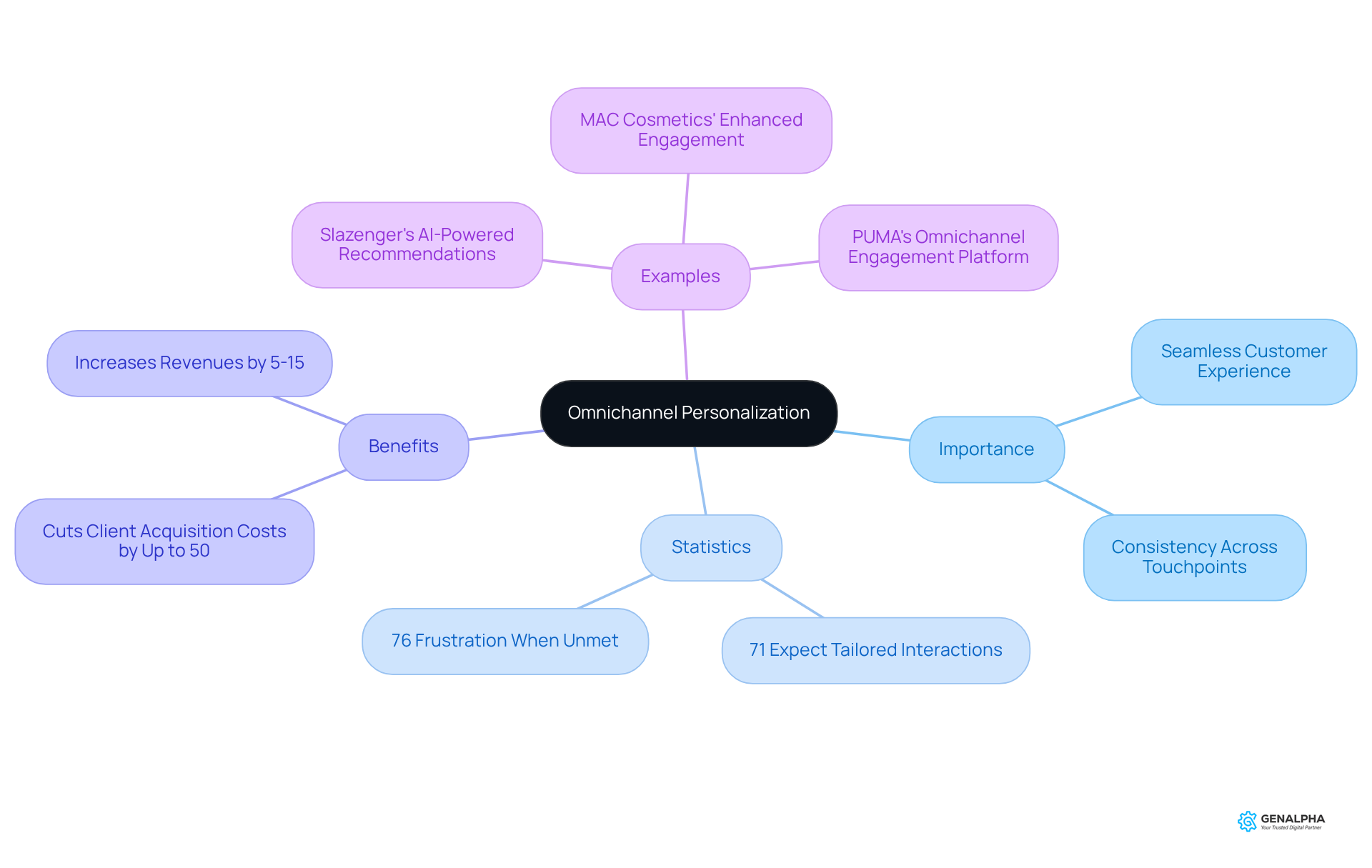
Conclusion
Ecommerce personalisation isn’t just a passing trend; it’s a crucial strategy that manufacturers need to embrace if they want to succeed in a competitive market. By offering tailored experiences, businesses can boost customer engagement, increase sales, and build loyalty. The insights shared in this article show how personalisation can forge meaningful connections with customers, leading to better business performance and happier customers.
Let’s look at the key arguments that highlight the many benefits of ecommerce personalisation. We’re talking about:
- Increased average order values
- Lower cart abandonment rates
- Improved customer loyalty
- A unique edge in a crowded marketplace
The advantages are crystal clear! Data-driven insights and analytics are vital in crafting these strategies, helping manufacturers meet the ever-changing expectations of their customers.
As Generation Alpha’s purchasing power keeps rising, embracing ecommerce personalisation will be essential for manufacturers aiming for future success. By focusing on these strategies and seeking out innovative solutions, businesses can create seamless customer journeys that resonate across all platforms. So, why wait? Now is the perfect time to dive into personalisation—it could elevate individual brands and transform the ecommerce landscape in the manufacturing sector.
Frequently Asked Questions
What is GenAlpha Technologies focused on?
GenAlpha Technologies specializes in creating digital solutions that simplify ecommerce personalization for manufacturers, with a flagship product called Equip360 designed to streamline inventory management and enhance client interactions.
How does ecommerce personalization benefit manufacturers?
Ecommerce personalization helps manufacturers create tailored shopping experiences using advanced analytics and first-party customer data, which drives engagement and fuels sales growth.
What is the purchasing power of Generation Alpha projected to be by 2029?
Generation Alpha is projected to have a purchasing power of $5.5 trillion by 2029, emphasizing the importance of ecommerce personalization for manufacturers.
Why is ecommerce personalization becoming crucial for manufacturers?
As consumer expectations evolve, ecommerce personalization helps make retail offers more relevant and less awkward, which is essential for manufacturers to maintain customer loyalty and satisfaction.
How does ecommerce personalization enhance customer experience?
By tailoring product suggestions, content, and communications to individual preferences, ecommerce personalization boosts client satisfaction and fosters loyalty, leading to a more enjoyable shopping experience.
What impact does personalization have on revenue?
Companies that implement ecommerce personalization strategies can generate 40% more revenue compared to those that do not.
What percentage of consumers are likely to purchase from brands that highlight products they recently searched for?
Approximately 83% of consumers are likely to make a purchase from brands that showcase specific products they have recently searched for.
What are the financial benefits of ecommerce personalization?
Ecommerce personalization can lead to a revenue increase of 10 to 15 percent, with some companies experiencing gains between 5 to 25 percent.
How can manufacturers implement ecommerce personalization effectively?
Manufacturers can use personalized recommendations based on browsing and buying history, such as suggesting complementary products at checkout, to enhance the shopping experience and increase sales.
What is a key consideration for manufacturers when personalizing ecommerce experiences?
It is crucial for manufacturers to balance personalization with data privacy, ensuring transparency and compliance with regulations like GDPR and CCPA to build trust with clients.




